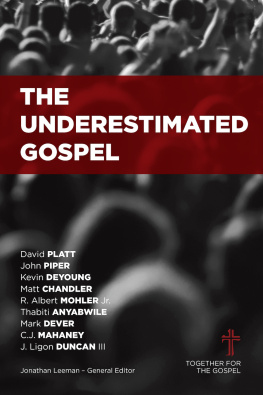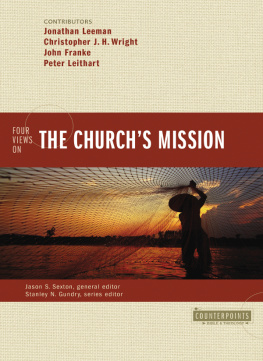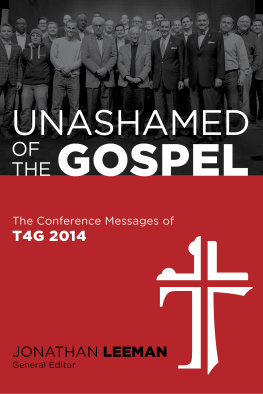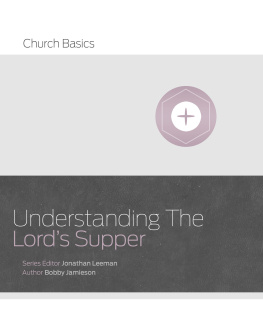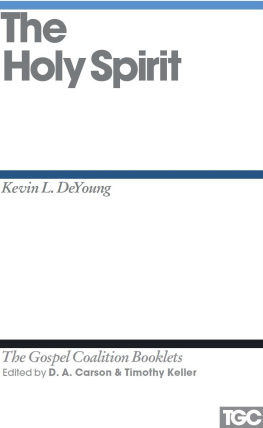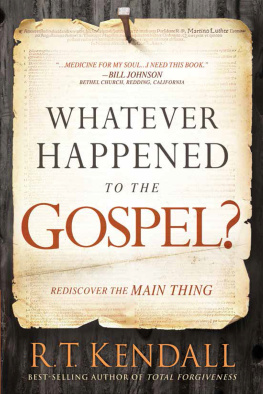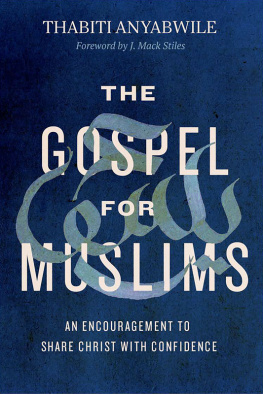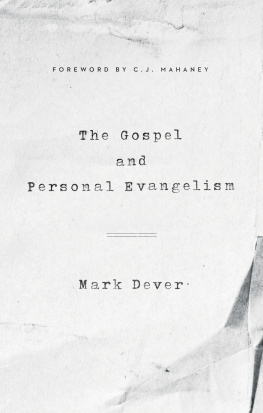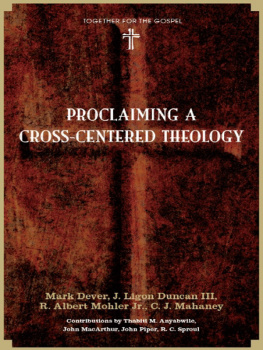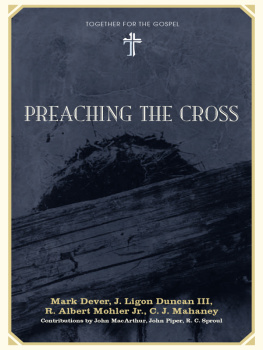Copyright 2014 by Together for the Gospel
All rights reserved.
Printed in the United States of Ameria
978-1-4336-8390-9
Published by B&H Publishing Group
Nashville, Tennessee
Dewey Decimal Classification: 226
Subject Heading: BIBLE. N.T. GOSPELS \ CHRISTIAN LIFE \ GOSPEL
Unless otherwise noted, Scripture is taken from the English Standard Version ( esv ), copyright 2001 by Crossway, a publishing ministry of Good News Publishers. Used by permission. All rights reserved. Also used: New International Version ( niv ), copyright 1973, 1978, 1984, 2011 by International Bible Society.
1 2 3 4 5 6 7 8 9 18 17 16 15 14
Foreword
Matt Schmucker
For Mark Devers pastoral installation service at Capitol Hill Baptist Church in September 1994, a neighboring churchs pastor was asked to participate. He welcomed Mark to the Capitol Hill neighborhood by referring to my good friend Mark Dever, but he pronounced Marks last name Deaver as in beaver, rather than Dever as in never.
Good friend? Really?
That week marked my tenth anniversary of being a Christian, and I cannot say I had been encouraged by what I had seen of church leaders in those ten years. Mostly I had encountered the clubby, partisan, institution-bound individuals who lived by the creed Go along to get along. Or I had run across the strongly dogmatic characters who have biting and condescending words for any fellow Christians who disagreed with them. Needless to say, I wasnt impressed with either group; and certainly I was not impressed with the pretense of friendship when there is none.
This is why I love Together for the Gospel (T4G). The men behind this conferenceand the authors of this bookhave a real and deep knowledge of and affection for each other. Even more impressive, they have a real and deep unity despite the myriad issues that have separated other men. Back in 2006 at the first T4G conference Mark Devers introductory comments included this about his fellow speakers:
We wouldnt agree on any number of matters. We didnt even agree on what to wear, or what kind of pulpit to use. We barely got agreement on the music. Our music is not all alike, nor are we similarly expressive in singing. Our introductions would be different. Some would respond to a sermon with applause, others would say Amen (and even that we would pronounce differently!). But, it was for none of these reasons that we come together. We come together for what we do agree on; we come together for the gospel.
Al Mohler put it succinctly when he said, I have more in common with a thick Presbyterian than I do with a thin Baptist. He and Ligon Duncan, a thick Presbyterian, share far more in common than either do with someone in their own denominations who dont affirm the inerrancy of Scripture, the resurrection, or the virgin birth.
Has their friendship been tested? I grew up with six brothers. I know brothers can fight. These guys fight and argue like everyone else. (Ive found myself dazed and confused many times sitting in their meetings watching the great theological debates of the day flash before my eyes.) But what Ive seen from them is that the gospel is thicker than blood. Unity prevails! Some of these men have endured great physical challenges, others blistering public scrutiny such that youd rather have the skin ripped off your back. Yet they stoodtogether. Job could have used friends like these.
In Philippians 2:2, Paul told the Philippians to make my joy complete by being like-minded, having the same love, being one in spirit and purpose ( niv 1984 ). I have seen this call beautifully modeled in how these brothers, preachers, and authors differ with one another in eschatology and ecclesiology.
How do I know? I have had the privilege of a lifetime to work with these men to help organize T4G 2006, 2008, 2010, and 2012. We have met many times. Im happy to call all of them Pastor. Therefore, with full confidence I commend both the messages of this book and the men behind them. More important, I join with these brothers and commend Jesus Christ who is the gospel and the only reason we are together .
How good and pleasant it is when brothers live together in unity! (Ps. 133:1 niv 1984 )
Introduction
Jonathan Leeman
If you have not read Arnold Dallimores two-volume biography of George Whitefield, you might consider taking the first volume on your next vacation. It is both edifying and enjoyable, but you will need more than one vacation to get through both tomes.
The book offers a remarkable chronicle of the life and times of the great evangelist of the eighteenth-century revival, as the subtitle has it. Interestingly, it opens by describing the moral corruption and spiritual decay that characterized post-Puritan England in the early eighteenth century, the kind of declension that caused some to conclude that God was done with England. Maybe you think the same thing about the global West today? Yet into this dark night came a young Anglican minister who preached the justice and mercy of God, the goodness and guilt of humanity, the substitution and resurrection of Christ, and the call to repentance and belief. Unaccommodating clergy forced Whitefield out of their church buildings and into the open fields, where, by Gods typically atypical designs, thousands, even tens of thousands, could gather to hear Whitefields underestimated gospel. And respond. Throughout England and America, conversions numbered in the tens of thousands, if not hundreds of thousands. Historians call it the First Great Awakening.
Yet Dallimore did not write as a dispassionate historian. He admits in the introduction that this book goes forth with a mission. First published in 1970, when the oldest preacher in the volume that you are now holding was a seminary student and the youngest was nine years short of birth, Dallimore hoped the stories of Whitefield would stoke the fires of gospel revival in our own day. And he knew it would take a new generation of preachers to stand squarely on the Scriptures and the gospel. Prophetically, he writes:
Yet this book is written in the desireperhaps in a measure of inner certaintythat we shall see the great Head of the Church once more bring into being His special instruments of revival, that He will again raise up unto Himself certain young men whom He may use in this glorious employ. And what manner of men will they be? Men mighty in the Scriptures, their lives dominated by a sense of the greatness, the majesty and holiness of God, and their minds and hearts aglow with the great truths of the doctrines of grace. They will be men who have learned what it is to die to self, to human aims and personal ambitions; men who are willing to be fools for Christs sake, who bear reproach and falsehood, who will labour and suffer, and whose supreme desire will be, not to gain earths accolades, but to win the Masters approbation when they appear before His awesome judgment seat. They will be men who will preach with broken hearts and tear-filled eyes, and upon whose ministries God will grant an extraordinary effusion of the Holy Spirit, and who will witness signs and wonders following in the transformation of multitudes of human lives.
The biographer concludes these remarks with the earnest prayer that, amidst the rampant iniquity and glaring apostasy of our day, God would raise up a new generation of such men toward the granting of a mighty revival such as was witnessed two hundred years ago.
Any Christian who stops to consider the matter would surely echo the late Dallimores prayer. What Christians heart does not yearn for our neighbors to wake up to the deceitful nature of sin. Sin promises the world, but only provides a two-dimensional cardboard version, like a theater stage set, not to mention the divine wrath to come. And we know that, if only our friends and neighbors would turn and be converted, the full-life, warm-breath embrace of a Creator and Savior awaits. How this embrace has given joy and hope to our own sin-clouded hearts!
Next page
